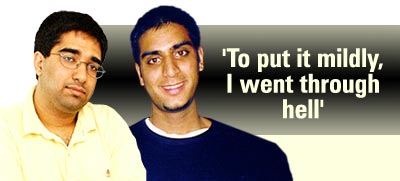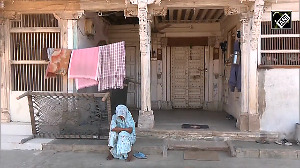
Three years have passed since that horrific morning when the Twin Towers came down.
Many Indian-Americans perished on 9/11, leaving behind distraught wives and husbands, and children devastated by the loss of a parent.
TANMAYA KUMAR NANDA meets RISHI and SHAMIR PARMAR and NEEL JERATH, who lost their fathers at the World Trade Centre, to find out how they overcome that daily battle against pain.
Growing up is something everyone is familiar with, yet it is the one process imbued with the most intrigue; there are no indicators, no physical requirement, no cut-off date. Often enough, it is imperceptible, at other times, you wake up one morning and realise that the time has come to don an enormous responsibility that has been draped around you by the cruel hand of circumstance.
Three years since New York skies darkened with the smoke and ash of two crumbling skyscrapers, some of the children of 9/11 victims have found themselves thrust into a role they had been little prepared for, for a role they had safely assumed would be theirs a few years hence; in the meanwhile, there was school to attend, get an education, ballgames to go to, friends to hang out with, the routine stuff of daily life that seeps slowly into the mold that is making you the person you will be.
"I am now the man of the house," says Rishi Parmar (right), very matter-of-factly. In the light of such resolve, it might be rather easy to forget that he is all of 19, only just entering his sophomore year, and that he struggled through his high school year in every sense -- emotionally, academically, every which way -- before he accepted an unbelievable fact and slipped into the role that his father, Hansmukh Parmar, once played at home.
In Edison, a drive away, another son also struggled with his inner demons before coming to grip with the fact that life waits for none.
Neel Jerath (left) admits he became a wreck in his first year at college following the passing of his father, Prem Nath Jerath, and that he still hasn't quite come to terms with it.
"To be honest, there are still rough days," he says. "But it's only sometimes, for the most part I do my own thing, I'm either at school or helping mom or doing something but sometimes something small whiplashes me back to memories of that time."
'Those times' is a reference to his second year at Brandeis University where he went back to after the 9/11 attacks. "Oh man, then and now is like night and day, it's that different actually, it's beyond different!," he exclaims.
Prem Nath Jerath, 59, was a structural engineer for the Port Authority and was last seen on the 82nd floor of WTC-I.
A dozen years younger, Hansmukh Parmar was last seen on the 103rd floor of the same building, where he worked at Cantor Fitzgerald, a job he had had for about a year.
Both were very strong family men, sharing a bond with their sons that is as common as it is rare -- Jerath made it a point to sit with his son and watch the business news every evening, while Parmar would come home and sometimes jam with Rishi on the guitar or trade car talk with the younger Shamir. Both men used their downtime to play basketball with their progeny, shooting hoops in their yard. Both were not original basketball players, both learnt the game, often picking up tips and tactics from their sons as they went along.
Parmar taught his first-born how to pluck guitar strings, how to play classic rock, from Jimi Hendrix to the Beatles, followed basketball games, taught Shamir about car engines and mechanics, and smiled through it all like there was no tomorrow while, in another home, another world, Jerath sat on a couch with Neel every day while they waited for his wife and his son's mother to come home from work and explained the intricacies of the market to him and took walks with him, tried to understand the ideas and ideology of Star Trek from his Trekkie son and shot hoops, and a day before dropping him off at college wrote the Do's and Don't of Life on a sheet of paper in a hotel room in Michigan.
And just like that, one sunny morning in September, they were gone, leaving memories of themselves to talk of them through the homes they would never come back to share with their sons.
So Jerath would never hear of the trauma that Neel went through, the times he refused to step out. "To put it mildly, I went through hell," Neel says. "Crazy as it might sound, I wouldn't go out of my dorm and what made it worse was the dorm had this castle motif, with hidden passageways and I was afraid people were hiding there. I was paranoid, to put it mildly." Eventually, he was forced to go out -- for food to the dining hall.
He has since put those dark days behind him, thanks in large part to the fact that he transferred to Rutgers and moved back in with his mom. Nonetheless, he still has the nightmares that plagued him at Brandeis. "It's this recurring theme of a third-party perspective of the different ways in which my father passed on," he says. Likely, he argues, because the family never really knew what happened. "1,200 people were never found and we have no idea, either."
Rishi found out how to handle the pain in his own way. The first indication, like Neel, was a sharp drop in concentration at school. "My dad used to be with me every step of the way, from academics to sports to music," he says. "He was not like a lot of other Indian fathers I saw, he let us do everything, and he came for every single game of mine, no matter where in the country it was," remembers Rishi, who tried out for the varsity basketball team but has been forced into giving up the game temporarily when his knee gave out during a game.
"I was in a lot of pain during that time and that was when I most wished my father had been around," he says, recalling how his father had the biggest smile in the family, indeed, in their entire social circle.
That, Shamir thinks, may have rubbed off on him. "I think I got that part of him," he says rather shyly. While Rishi and their dad were down in the basement watching ballgame, the youngest member of the family would sometimes pore through car magazines. "We were going to buy an old Porsche and build it up from scratch," says Shamir, whose favourite model is a Porsche 411. "Maybe I will do that as a memento some day."
For now, though, all of them keep their father close: Rishi has a photograph in his dorm, and his father's electric guitar, Shamir carries a picture of his father in his wallet. Neel keeps the Do's and Dont's his father wrote in a hotel room in Michigan along with a copy of the Gayatri Mantra. But sometimes, the old anger still bubbles through to the surface. "It just erupts into a huge ball of anger."
And then he remembers what his father used to day about keeping a cool head and thinking logically and not get excited and that "helps me through it." Sometimes he goes for a walk.
For the Jeraths, it took time to simply accept the fact of what had forever changed their lives. "For days people were showing up and we were also thinking 'This can't happen to us', we kept expecting dad to walk through the door; it's taken time but I think we have accepted that he's not coming home." But he still misses him, still regrets the fact that his father was not there for his graduation, nor for the time he got his driver's license, for the little things that milestone the journey of a boy becoming a man.
In fact, when news of the planes ramming into the WTC broke at school, says Rishi, it didn't even initially cross his mind that his father might have been at the site of the attacks. "We were into our second or third period and when our teacher announced it, it didn't strike me that my dad was there," he recalls. "I remember that day very clearly, he drove me and (my brother) Shamir to school and I remember he was driving fast."
Showing a rare maturity beyond his years, Rishi says it is futile to get angry. "What happened has happened, we can't do anything about it, we have no say."
And yet, there have been unexpected ways in which the families have come together. All the young boy-men, for example, admit readily that while their father had been their best friend, they are now much closer to their mothers than they had ever been.
"I was only a caregiver then since I was working long hours and the father and son got home early and did everything together," recalls Meena Jerath, an independent CPA. "Now we have grown much closer, now we talk about everything between ourselves."
"But sometimes, what bothers me the most that he didn't enjoy some aspects of his life as much as I would have liked him to, because he was so focused on taking care of his family, he would never let anything bother me."
Rishi, who would also talk to his Dad about "everything" now goes to his mother for guidance. "It's been hard on her also, but we have grown closer, it's something different, we bond better," he says. "She has learnt to be more independent, stronger." And if Rishi has taken on the mantle of the man of the house -- "it is hard but I have to" -- Shamir has become the man about the house.
"Earlier, Dad would do everything in the house, all the repairs and fixing that needed to be done, I take care of all that now," he says simply.
Neel, meanwhile, has taken to something his father used to do -- gardening. "It's both relaxing and healing," he says, laughing about his lime tree that yielded one, just one, fruit in three years. "But it was a huge one," he says, as both mother and son laugh out loud in a shared moment of private amusement about the tomatoes, eggplant, cucumber and hot peppers -- "For mom" -- that Neel tends to, and his mother reminds him of 12 years ago, a lifetime ago almost, when his father had his own strawberry fields in the backyard.
And all those evenings when Prem Nath Jerath made his teenage son sit with him and watch the business news haven't changed either.
Except the son had to grow up suddenly and now watches it by himself.
This feature first appeared in India Abroad, the oldest and largest circulated Indian-American newspaper, owned by rediff.com
Photographs: Paresh Gandhi
Image: Uday Kuckian






 © 2025
© 2025